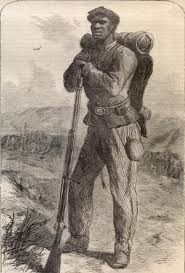 Today “The Slave-Martyr,” a poem originally published in The American Baptist, is re-printed in The Anglo-African. The American Baptist is a publication of Northern (American) Baptists, produced weekly by the Utica, New York-based American Baptist Free Mission Society. The society and the publication are self-described as “intensely abolitionist.” The Washington, D.C.-based abolitionist newspaper the National Era advertised (on April 28, 1853) the American Baptist as “the only Baptist newspaper in the United States advocating the principle of non-fellowship with slaveholders, either in ecclesiastical or in voluntary missionary organizations.”
Today “The Slave-Martyr,” a poem originally published in The American Baptist, is re-printed in The Anglo-African. The American Baptist is a publication of Northern (American) Baptists, produced weekly by the Utica, New York-based American Baptist Free Mission Society. The society and the publication are self-described as “intensely abolitionist.” The Washington, D.C.-based abolitionist newspaper the National Era advertised (on April 28, 1853) the American Baptist as “the only Baptist newspaper in the United States advocating the principle of non-fellowship with slaveholders, either in ecclesiastical or in voluntary missionary organizations.”
The poem thus reads:
[During the siege of Washington, N. C., a flat full of soldiers, with a few negroes, got aground under rebel fire. A heroic African said, “Somebody’s got to die to get us out of this, and it may as well be me!” He then deliberately got out and pushed the boat off, and fell into it, pierced by five bullets.]
The surf with ricochetting balls Was churned and splashed around us; I heard my comrades’ hurried calls, “The rebel guns have found us.”
Our vessel shivered; far beneath The treacherous sand had caught her; What man will leap to instant death To shove her into water?
Strange light shone in our hero’s eye; His voice was strong and steady: “My brothers, one of us must die, And I, thank God! am ready.”
A shell flew toward us, hissing hate, Then screaming like a demon; He calmly faced the awful fate, Resolved to die a freeman!
He fell, his heart cut through with shot. The true blood of that martyr Out from his body spurted hot, To flee the shame of barter.
We lifted up the brave man’s corse; We thought him fair and saintly; The rebel bullets round us hoarse We heard, but dull and faintly.
‘Tis ever so: a great deed wrought, The doer falls that moment, As if to save the God-like thought From any human comment.
Heroes are dead men by that fact; Fame haunts our grave-yards, sighing, “Alas! that man’s divinest act Should be the act of dying.”
Sources: E. W. Brown, “The Slave-Martyr,” The Anglo-African, June 13, 1863 (link); E. W. Brown, The Whole World Kin: A Pioneer Experience Among Remote Tribes, and Other Labors of Nathan Brown, Philadelphia: Hubbard, 1890, p. 456; see John R. McKivigan, History of the American Abolitionist Movement, New York: Routledge, 1999, pp. 152-153 (link); image (link)


